BO1CLAW314 Corporate Law: Director's Duties, Breaches & Analysis
VerifiedAdded on 2023/04/21
|10
|2622
|185
Report
AI Summary
This report examines a scenario involving two company directors, Lilian and Gumpta, and analyzes whether they breached their duties as directors under Australian corporate law, specifically the Corporations Act 2001. Lilian, a director of All Mine Pty Ltd, entered into a contract with Gumpta, managing director of Greedyas Pty Ltd, despite being aware of All Mine's poor financial condition. Gumpta, also aware of All Mine's financial state, proceeded with the sale to meet targets. The report argues that both directors breached their duties; Lilian for insolvent trading under section 588G and failing to act in the company's best interest, and Gumpta for lack of due care and misuse of company information regarding a prospective merger for personal gain, violating section 183. The analysis references key cases such as Salomon v A Salomon & Co Ltd and ASIC v Adler to support the findings, detailing potential civil and criminal liabilities for the breaches, including penalties and compensation orders.
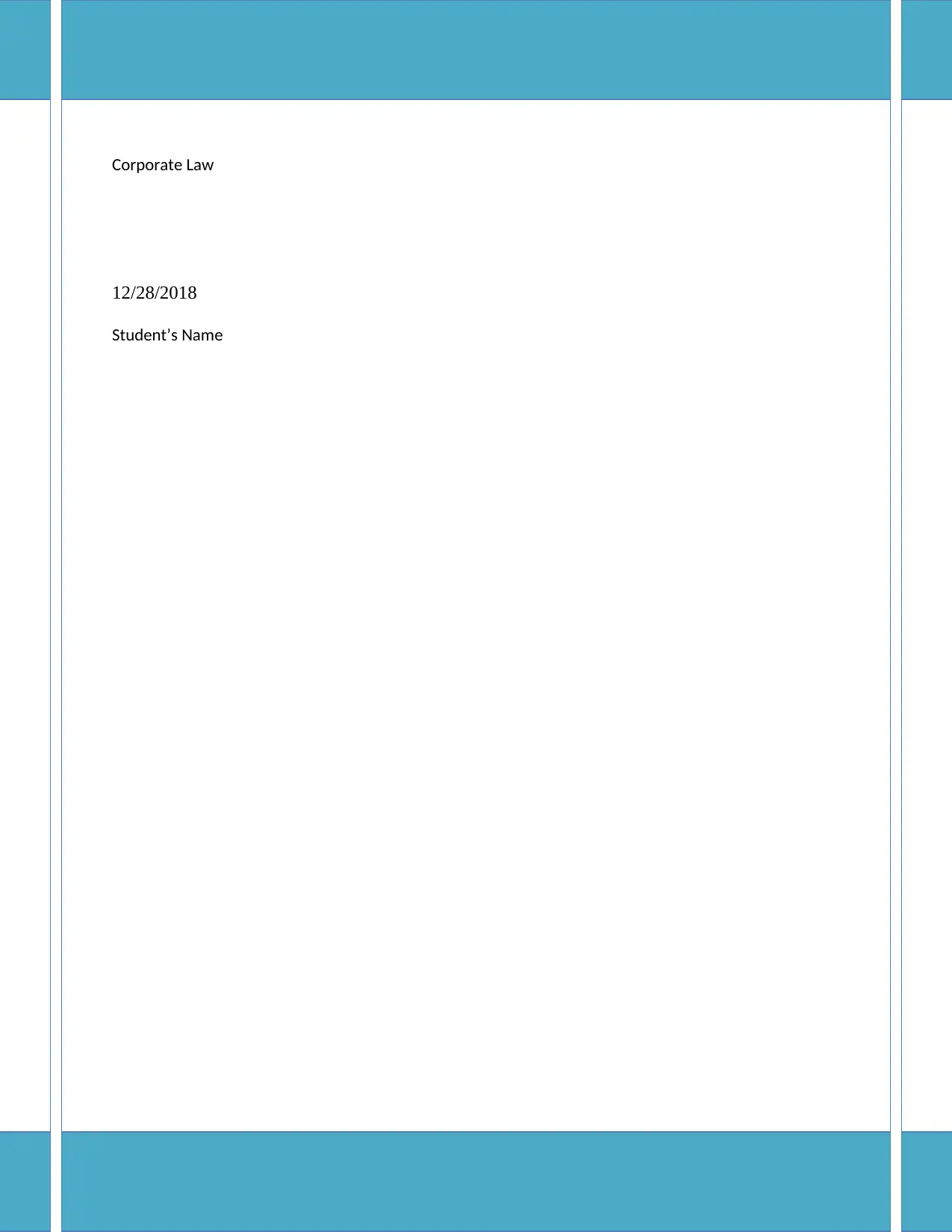
Running Head: BUSINESS AND CORPORATION LAW 0
Corporate Law
12/28/2018
Student’s Name
Corporate Law
12/28/2018
Student’s Name
Paraphrase This Document
Need a fresh take? Get an instant paraphrase of this document with our AI Paraphraser
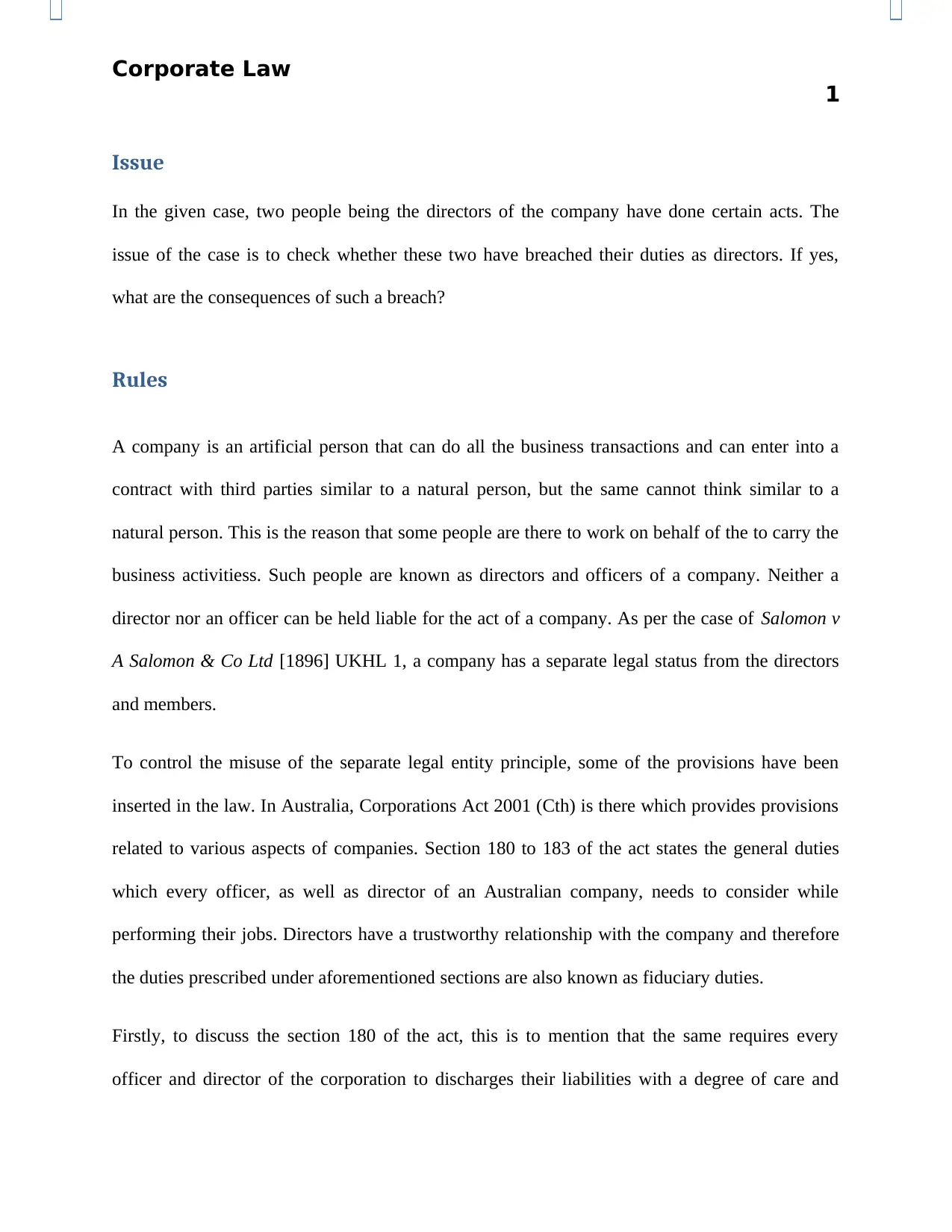
Corporate Law
1
Issue
In the given case, two people being the directors of the company have done certain acts. The
issue of the case is to check whether these two have breached their duties as directors. If yes,
what are the consequences of such a breach?
Rules
A company is an artificial person that can do all the business transactions and can enter into a
contract with third parties similar to a natural person, but the same cannot think similar to a
natural person. This is the reason that some people are there to work on behalf of the to carry the
business activitiess. Such people are known as directors and officers of a company. Neither a
director nor an officer can be held liable for the act of a company. As per the case of Salomon v
A Salomon & Co Ltd [1896] UKHL 1, a company has a separate legal status from the directors
and members.
To control the misuse of the separate legal entity principle, some of the provisions have been
inserted in the law. In Australia, Corporations Act 2001 (Cth) is there which provides provisions
related to various aspects of companies. Section 180 to 183 of the act states the general duties
which every officer, as well as director of an Australian company, needs to consider while
performing their jobs. Directors have a trustworthy relationship with the company and therefore
the duties prescribed under aforementioned sections are also known as fiduciary duties.
Firstly, to discuss the section 180 of the act, this is to mention that the same requires every
officer and director of the corporation to discharges their liabilities with a degree of care and
1
Issue
In the given case, two people being the directors of the company have done certain acts. The
issue of the case is to check whether these two have breached their duties as directors. If yes,
what are the consequences of such a breach?
Rules
A company is an artificial person that can do all the business transactions and can enter into a
contract with third parties similar to a natural person, but the same cannot think similar to a
natural person. This is the reason that some people are there to work on behalf of the to carry the
business activitiess. Such people are known as directors and officers of a company. Neither a
director nor an officer can be held liable for the act of a company. As per the case of Salomon v
A Salomon & Co Ltd [1896] UKHL 1, a company has a separate legal status from the directors
and members.
To control the misuse of the separate legal entity principle, some of the provisions have been
inserted in the law. In Australia, Corporations Act 2001 (Cth) is there which provides provisions
related to various aspects of companies. Section 180 to 183 of the act states the general duties
which every officer, as well as director of an Australian company, needs to consider while
performing their jobs. Directors have a trustworthy relationship with the company and therefore
the duties prescribed under aforementioned sections are also known as fiduciary duties.
Firstly, to discuss the section 180 of the act, this is to mention that the same requires every
officer and director of the corporation to discharges their liabilities with a degree of care and
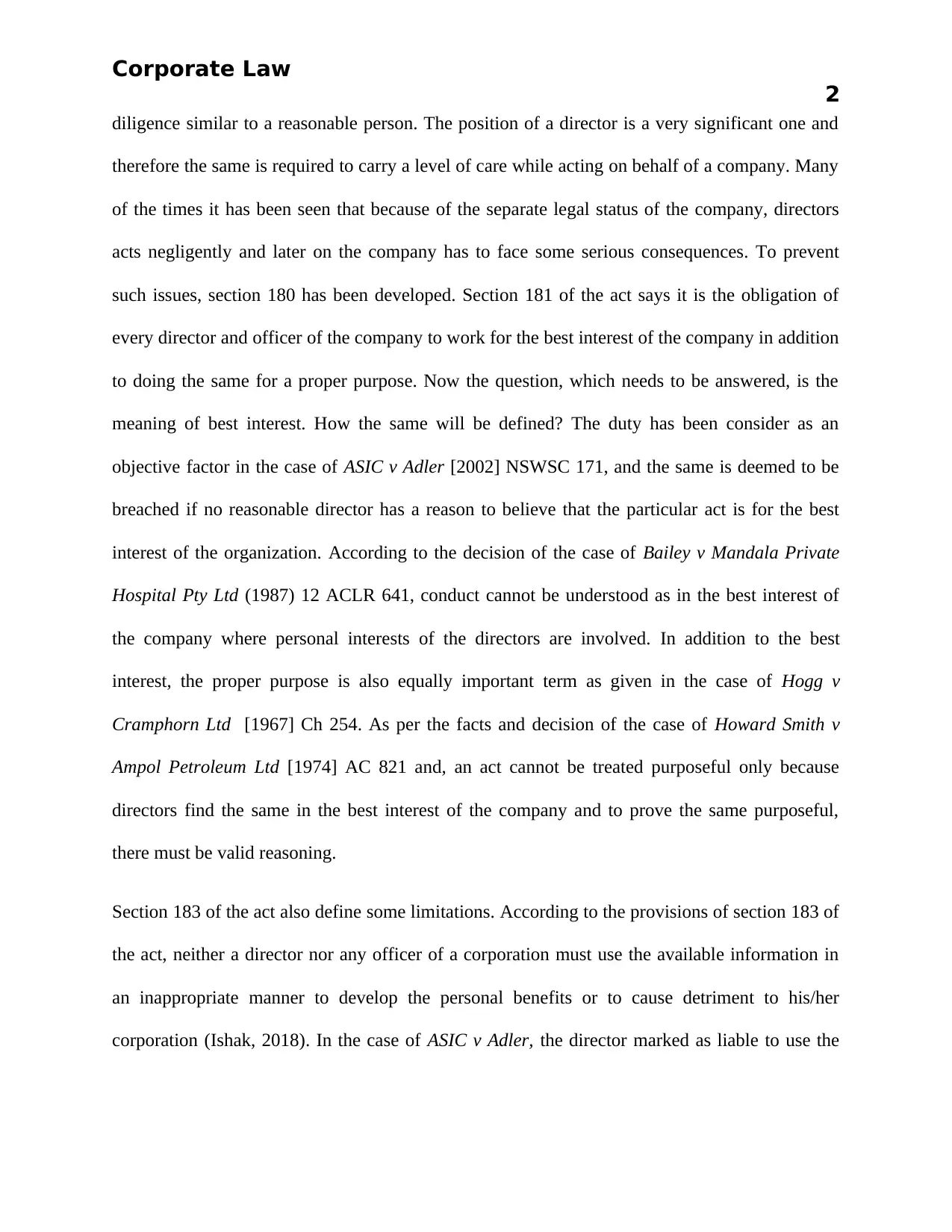
Corporate Law
2
diligence similar to a reasonable person. The position of a director is a very significant one and
therefore the same is required to carry a level of care while acting on behalf of a company. Many
of the times it has been seen that because of the separate legal status of the company, directors
acts negligently and later on the company has to face some serious consequences. To prevent
such issues, section 180 has been developed. Section 181 of the act says it is the obligation of
every director and officer of the company to work for the best interest of the company in addition
to doing the same for a proper purpose. Now the question, which needs to be answered, is the
meaning of best interest. How the same will be defined? The duty has been consider as an
objective factor in the case of ASIC v Adler [2002] NSWSC 171, and the same is deemed to be
breached if no reasonable director has a reason to believe that the particular act is for the best
interest of the organization. According to the decision of the case of Bailey v Mandala Private
Hospital Pty Ltd (1987) 12 ACLR 641, conduct cannot be understood as in the best interest of
the company where personal interests of the directors are involved. In addition to the best
interest, the proper purpose is also equally important term as given in the case of Hogg v
Cramphorn Ltd [1967] Ch 254. As per the facts and decision of the case of Howard Smith v
Ampol Petroleum Ltd [1974] AC 821 and, an act cannot be treated purposeful only because
directors find the same in the best interest of the company and to prove the same purposeful,
there must be valid reasoning.
Section 183 of the act also define some limitations. According to the provisions of section 183 of
the act, neither a director nor any officer of a corporation must use the available information in
an inappropriate manner to develop the personal benefits or to cause detriment to his/her
corporation (Ishak, 2018). In the case of ASIC v Adler, the director marked as liable to use the
2
diligence similar to a reasonable person. The position of a director is a very significant one and
therefore the same is required to carry a level of care while acting on behalf of a company. Many
of the times it has been seen that because of the separate legal status of the company, directors
acts negligently and later on the company has to face some serious consequences. To prevent
such issues, section 180 has been developed. Section 181 of the act says it is the obligation of
every director and officer of the company to work for the best interest of the company in addition
to doing the same for a proper purpose. Now the question, which needs to be answered, is the
meaning of best interest. How the same will be defined? The duty has been consider as an
objective factor in the case of ASIC v Adler [2002] NSWSC 171, and the same is deemed to be
breached if no reasonable director has a reason to believe that the particular act is for the best
interest of the organization. According to the decision of the case of Bailey v Mandala Private
Hospital Pty Ltd (1987) 12 ACLR 641, conduct cannot be understood as in the best interest of
the company where personal interests of the directors are involved. In addition to the best
interest, the proper purpose is also equally important term as given in the case of Hogg v
Cramphorn Ltd [1967] Ch 254. As per the facts and decision of the case of Howard Smith v
Ampol Petroleum Ltd [1974] AC 821 and, an act cannot be treated purposeful only because
directors find the same in the best interest of the company and to prove the same purposeful,
there must be valid reasoning.
Section 183 of the act also define some limitations. According to the provisions of section 183 of
the act, neither a director nor any officer of a corporation must use the available information in
an inappropriate manner to develop the personal benefits or to cause detriment to his/her
corporation (Ishak, 2018). In the case of ASIC v Adler, the director marked as liable to use the
⊘ This is a preview!⊘
Do you want full access?
Subscribe today to unlock all pages.

Trusted by 1+ million students worldwide
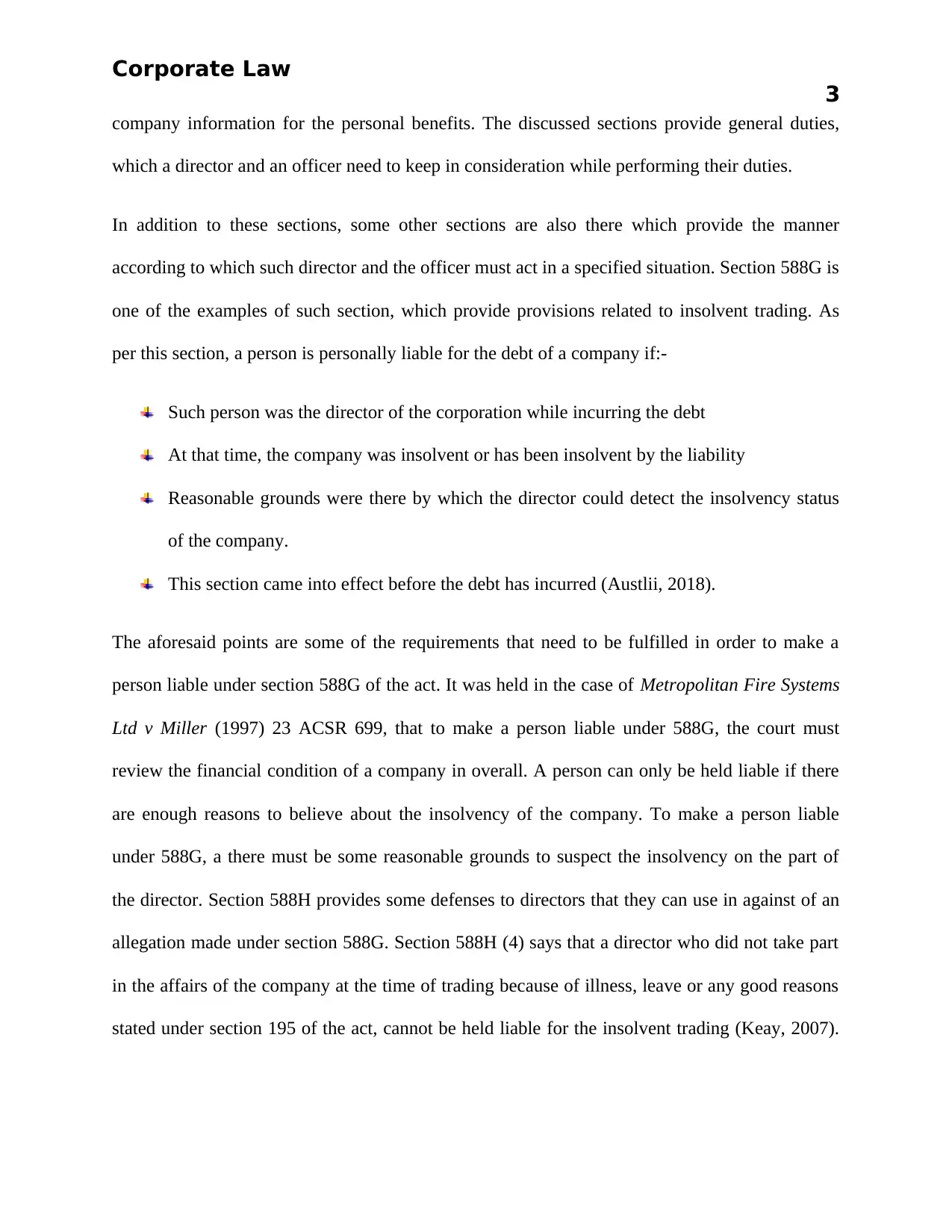
Corporate Law
3
company information for the personal benefits. The discussed sections provide general duties,
which a director and an officer need to keep in consideration while performing their duties.
In addition to these sections, some other sections are also there which provide the manner
according to which such director and the officer must act in a specified situation. Section 588G is
one of the examples of such section, which provide provisions related to insolvent trading. As
per this section, a person is personally liable for the debt of a company if:-
Such person was the director of the corporation while incurring the debt
At that time, the company was insolvent or has been insolvent by the liability
Reasonable grounds were there by which the director could detect the insolvency status
of the company.
This section came into effect before the debt has incurred (Austlii, 2018).
The aforesaid points are some of the requirements that need to be fulfilled in order to make a
person liable under section 588G of the act. It was held in the case of Metropolitan Fire Systems
Ltd v Miller (1997) 23 ACSR 699, that to make a person liable under 588G, the court must
review the financial condition of a company in overall. A person can only be held liable if there
are enough reasons to believe about the insolvency of the company. To make a person liable
under 588G, a there must be some reasonable grounds to suspect the insolvency on the part of
the director. Section 588H provides some defenses to directors that they can use in against of an
allegation made under section 588G. Section 588H (4) says that a director who did not take part
in the affairs of the company at the time of trading because of illness, leave or any good reasons
stated under section 195 of the act, cannot be held liable for the insolvent trading (Keay, 2007).
3
company information for the personal benefits. The discussed sections provide general duties,
which a director and an officer need to keep in consideration while performing their duties.
In addition to these sections, some other sections are also there which provide the manner
according to which such director and the officer must act in a specified situation. Section 588G is
one of the examples of such section, which provide provisions related to insolvent trading. As
per this section, a person is personally liable for the debt of a company if:-
Such person was the director of the corporation while incurring the debt
At that time, the company was insolvent or has been insolvent by the liability
Reasonable grounds were there by which the director could detect the insolvency status
of the company.
This section came into effect before the debt has incurred (Austlii, 2018).
The aforesaid points are some of the requirements that need to be fulfilled in order to make a
person liable under section 588G of the act. It was held in the case of Metropolitan Fire Systems
Ltd v Miller (1997) 23 ACSR 699, that to make a person liable under 588G, the court must
review the financial condition of a company in overall. A person can only be held liable if there
are enough reasons to believe about the insolvency of the company. To make a person liable
under 588G, a there must be some reasonable grounds to suspect the insolvency on the part of
the director. Section 588H provides some defenses to directors that they can use in against of an
allegation made under section 588G. Section 588H (4) says that a director who did not take part
in the affairs of the company at the time of trading because of illness, leave or any good reasons
stated under section 195 of the act, cannot be held liable for the insolvent trading (Keay, 2007).
Paraphrase This Document
Need a fresh take? Get an instant paraphrase of this document with our AI Paraphraser
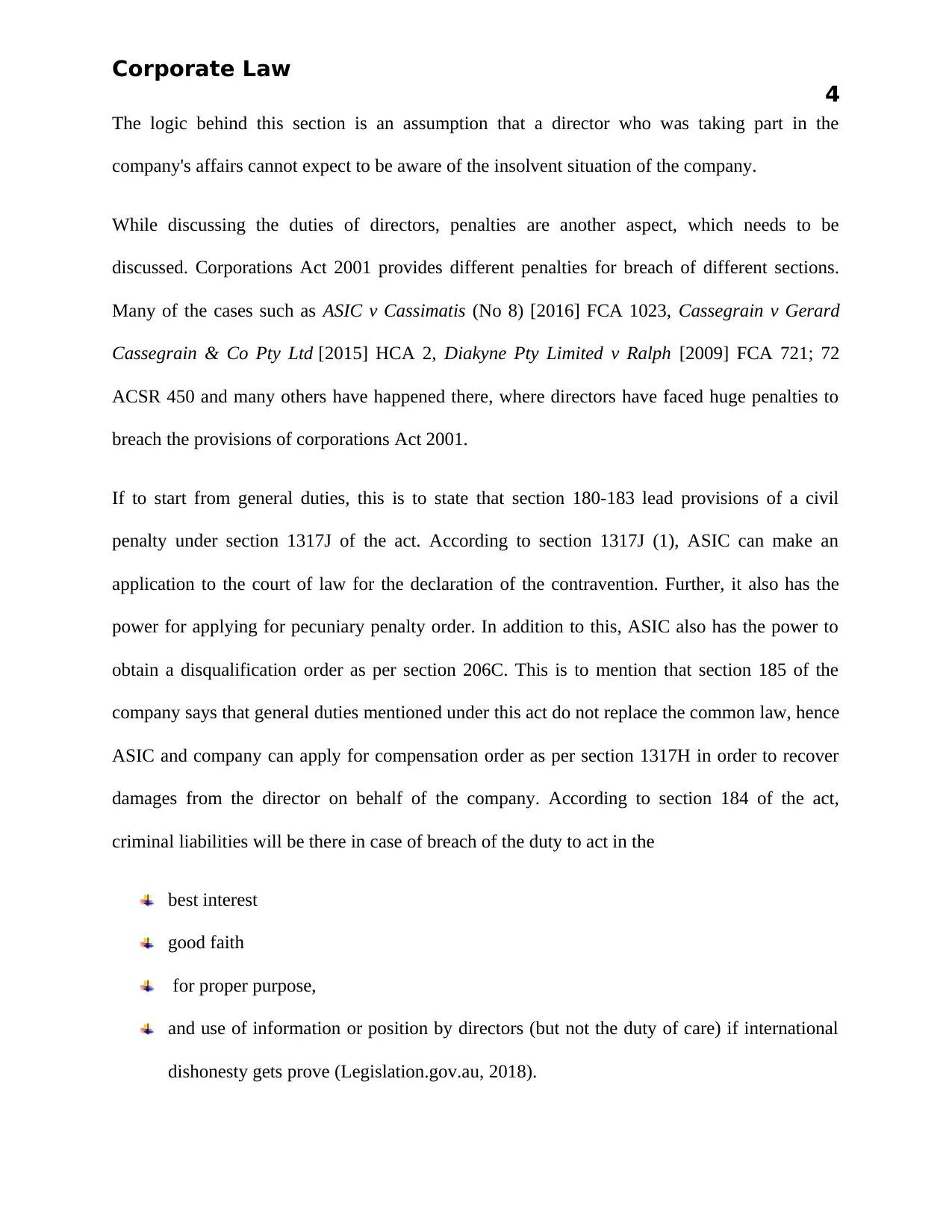
Corporate Law
4
The logic behind this section is an assumption that a director who was taking part in the
company's affairs cannot expect to be aware of the insolvent situation of the company.
While discussing the duties of directors, penalties are another aspect, which needs to be
discussed. Corporations Act 2001 provides different penalties for breach of different sections.
Many of the cases such as ASIC v Cassimatis (No 8) [2016] FCA 1023, Cassegrain v Gerard
Cassegrain & Co Pty Ltd [2015] HCA 2, Diakyne Pty Limited v Ralph [2009] FCA 721; 72
ACSR 450 and many others have happened there, where directors have faced huge penalties to
breach the provisions of corporations Act 2001.
If to start from general duties, this is to state that section 180-183 lead provisions of a civil
penalty under section 1317J of the act. According to section 1317J (1), ASIC can make an
application to the court of law for the declaration of the contravention. Further, it also has the
power for applying for pecuniary penalty order. In addition to this, ASIC also has the power to
obtain a disqualification order as per section 206C. This is to mention that section 185 of the
company says that general duties mentioned under this act do not replace the common law, hence
ASIC and company can apply for compensation order as per section 1317H in order to recover
damages from the director on behalf of the company. According to section 184 of the act,
criminal liabilities will be there in case of breach of the duty to act in the
best interest
good faith
for proper purpose,
and use of information or position by directors (but not the duty of care) if international
dishonesty gets prove (Legislation.gov.au, 2018).
4
The logic behind this section is an assumption that a director who was taking part in the
company's affairs cannot expect to be aware of the insolvent situation of the company.
While discussing the duties of directors, penalties are another aspect, which needs to be
discussed. Corporations Act 2001 provides different penalties for breach of different sections.
Many of the cases such as ASIC v Cassimatis (No 8) [2016] FCA 1023, Cassegrain v Gerard
Cassegrain & Co Pty Ltd [2015] HCA 2, Diakyne Pty Limited v Ralph [2009] FCA 721; 72
ACSR 450 and many others have happened there, where directors have faced huge penalties to
breach the provisions of corporations Act 2001.
If to start from general duties, this is to state that section 180-183 lead provisions of a civil
penalty under section 1317J of the act. According to section 1317J (1), ASIC can make an
application to the court of law for the declaration of the contravention. Further, it also has the
power for applying for pecuniary penalty order. In addition to this, ASIC also has the power to
obtain a disqualification order as per section 206C. This is to mention that section 185 of the
company says that general duties mentioned under this act do not replace the common law, hence
ASIC and company can apply for compensation order as per section 1317H in order to recover
damages from the director on behalf of the company. According to section 184 of the act,
criminal liabilities will be there in case of breach of the duty to act in the
best interest
good faith
for proper purpose,
and use of information or position by directors (but not the duty of care) if international
dishonesty gets prove (Legislation.gov.au, 2018).
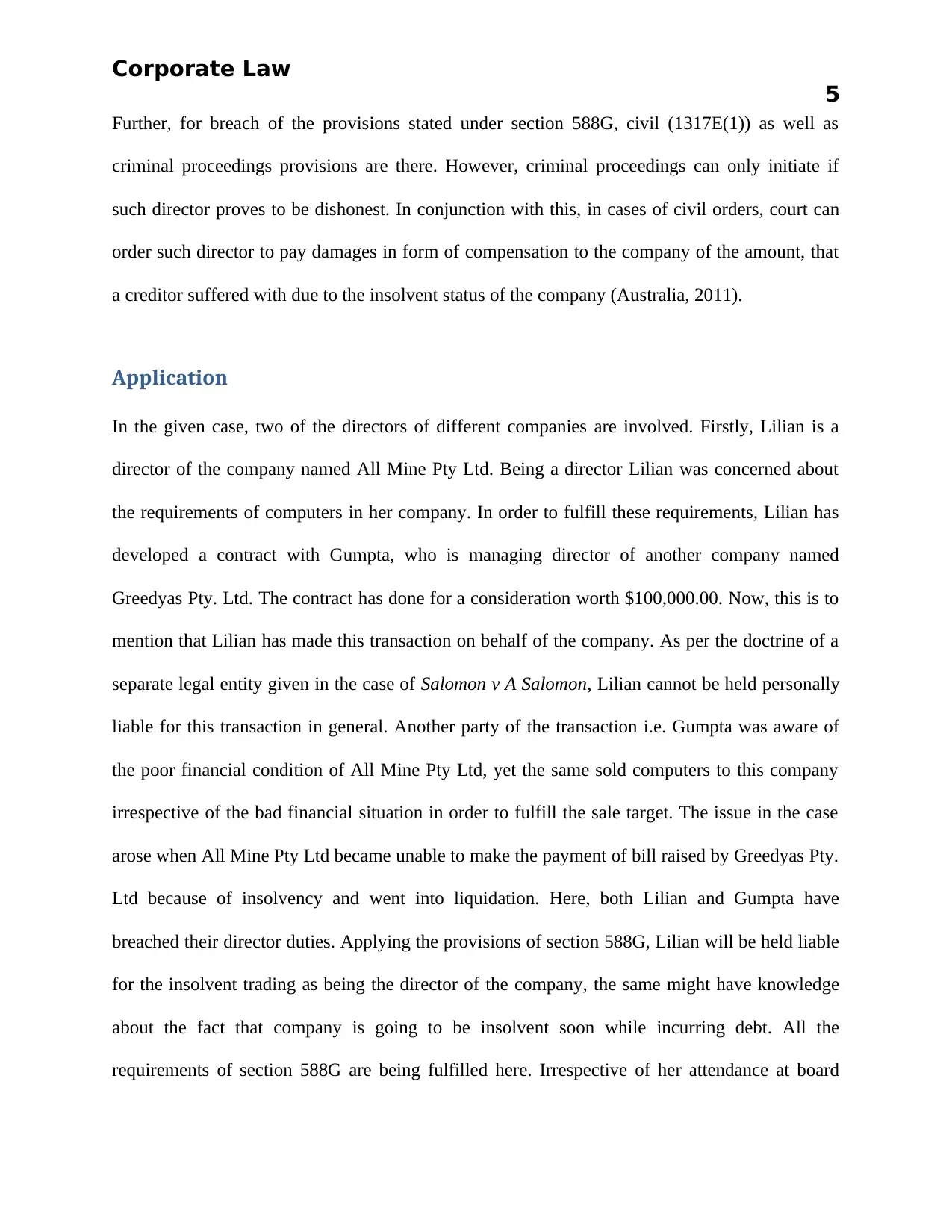
Corporate Law
5
Further, for breach of the provisions stated under section 588G, civil (1317E(1)) as well as
criminal proceedings provisions are there. However, criminal proceedings can only initiate if
such director proves to be dishonest. In conjunction with this, in cases of civil orders, court can
order such director to pay damages in form of compensation to the company of the amount, that
a creditor suffered with due to the insolvent status of the company (Australia, 2011).
Application
In the given case, two of the directors of different companies are involved. Firstly, Lilian is a
director of the company named All Mine Pty Ltd. Being a director Lilian was concerned about
the requirements of computers in her company. In order to fulfill these requirements, Lilian has
developed a contract with Gumpta, who is managing director of another company named
Greedyas Pty. Ltd. The contract has done for a consideration worth $100,000.00. Now, this is to
mention that Lilian has made this transaction on behalf of the company. As per the doctrine of a
separate legal entity given in the case of Salomon v A Salomon, Lilian cannot be held personally
liable for this transaction in general. Another party of the transaction i.e. Gumpta was aware of
the poor financial condition of All Mine Pty Ltd, yet the same sold computers to this company
irrespective of the bad financial situation in order to fulfill the sale target. The issue in the case
arose when All Mine Pty Ltd became unable to make the payment of bill raised by Greedyas Pty.
Ltd because of insolvency and went into liquidation. Here, both Lilian and Gumpta have
breached their director duties. Applying the provisions of section 588G, Lilian will be held liable
for the insolvent trading as being the director of the company, the same might have knowledge
about the fact that company is going to be insolvent soon while incurring debt. All the
requirements of section 588G are being fulfilled here. Irrespective of her attendance at board
5
Further, for breach of the provisions stated under section 588G, civil (1317E(1)) as well as
criminal proceedings provisions are there. However, criminal proceedings can only initiate if
such director proves to be dishonest. In conjunction with this, in cases of civil orders, court can
order such director to pay damages in form of compensation to the company of the amount, that
a creditor suffered with due to the insolvent status of the company (Australia, 2011).
Application
In the given case, two of the directors of different companies are involved. Firstly, Lilian is a
director of the company named All Mine Pty Ltd. Being a director Lilian was concerned about
the requirements of computers in her company. In order to fulfill these requirements, Lilian has
developed a contract with Gumpta, who is managing director of another company named
Greedyas Pty. Ltd. The contract has done for a consideration worth $100,000.00. Now, this is to
mention that Lilian has made this transaction on behalf of the company. As per the doctrine of a
separate legal entity given in the case of Salomon v A Salomon, Lilian cannot be held personally
liable for this transaction in general. Another party of the transaction i.e. Gumpta was aware of
the poor financial condition of All Mine Pty Ltd, yet the same sold computers to this company
irrespective of the bad financial situation in order to fulfill the sale target. The issue in the case
arose when All Mine Pty Ltd became unable to make the payment of bill raised by Greedyas Pty.
Ltd because of insolvency and went into liquidation. Here, both Lilian and Gumpta have
breached their director duties. Applying the provisions of section 588G, Lilian will be held liable
for the insolvent trading as being the director of the company, the same might have knowledge
about the fact that company is going to be insolvent soon while incurring debt. All the
requirements of section 588G are being fulfilled here. Irrespective of her attendance at board
⊘ This is a preview!⊘
Do you want full access?
Subscribe today to unlock all pages.

Trusted by 1+ million students worldwide
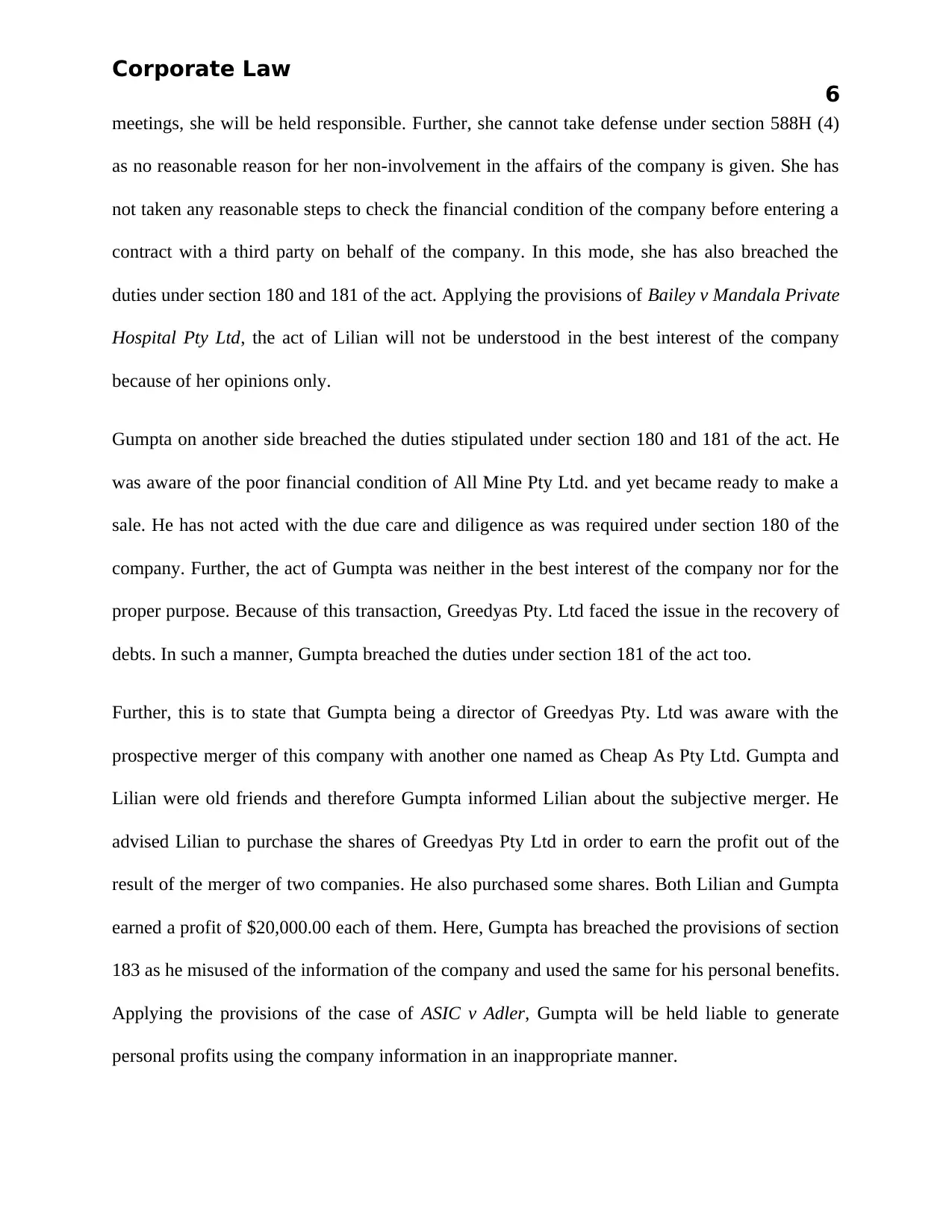
Corporate Law
6
meetings, she will be held responsible. Further, she cannot take defense under section 588H (4)
as no reasonable reason for her non-involvement in the affairs of the company is given. She has
not taken any reasonable steps to check the financial condition of the company before entering a
contract with a third party on behalf of the company. In this mode, she has also breached the
duties under section 180 and 181 of the act. Applying the provisions of Bailey v Mandala Private
Hospital Pty Ltd, the act of Lilian will not be understood in the best interest of the company
because of her opinions only.
Gumpta on another side breached the duties stipulated under section 180 and 181 of the act. He
was aware of the poor financial condition of All Mine Pty Ltd. and yet became ready to make a
sale. He has not acted with the due care and diligence as was required under section 180 of the
company. Further, the act of Gumpta was neither in the best interest of the company nor for the
proper purpose. Because of this transaction, Greedyas Pty. Ltd faced the issue in the recovery of
debts. In such a manner, Gumpta breached the duties under section 181 of the act too.
Further, this is to state that Gumpta being a director of Greedyas Pty. Ltd was aware with the
prospective merger of this company with another one named as Cheap As Pty Ltd. Gumpta and
Lilian were old friends and therefore Gumpta informed Lilian about the subjective merger. He
advised Lilian to purchase the shares of Greedyas Pty Ltd in order to earn the profit out of the
result of the merger of two companies. He also purchased some shares. Both Lilian and Gumpta
earned a profit of $20,000.00 each of them. Here, Gumpta has breached the provisions of section
183 as he misused of the information of the company and used the same for his personal benefits.
Applying the provisions of the case of ASIC v Adler, Gumpta will be held liable to generate
personal profits using the company information in an inappropriate manner.
6
meetings, she will be held responsible. Further, she cannot take defense under section 588H (4)
as no reasonable reason for her non-involvement in the affairs of the company is given. She has
not taken any reasonable steps to check the financial condition of the company before entering a
contract with a third party on behalf of the company. In this mode, she has also breached the
duties under section 180 and 181 of the act. Applying the provisions of Bailey v Mandala Private
Hospital Pty Ltd, the act of Lilian will not be understood in the best interest of the company
because of her opinions only.
Gumpta on another side breached the duties stipulated under section 180 and 181 of the act. He
was aware of the poor financial condition of All Mine Pty Ltd. and yet became ready to make a
sale. He has not acted with the due care and diligence as was required under section 180 of the
company. Further, the act of Gumpta was neither in the best interest of the company nor for the
proper purpose. Because of this transaction, Greedyas Pty. Ltd faced the issue in the recovery of
debts. In such a manner, Gumpta breached the duties under section 181 of the act too.
Further, this is to state that Gumpta being a director of Greedyas Pty. Ltd was aware with the
prospective merger of this company with another one named as Cheap As Pty Ltd. Gumpta and
Lilian were old friends and therefore Gumpta informed Lilian about the subjective merger. He
advised Lilian to purchase the shares of Greedyas Pty Ltd in order to earn the profit out of the
result of the merger of two companies. He also purchased some shares. Both Lilian and Gumpta
earned a profit of $20,000.00 each of them. Here, Gumpta has breached the provisions of section
183 as he misused of the information of the company and used the same for his personal benefits.
Applying the provisions of the case of ASIC v Adler, Gumpta will be held liable to generate
personal profits using the company information in an inappropriate manner.
Paraphrase This Document
Need a fresh take? Get an instant paraphrase of this document with our AI Paraphraser
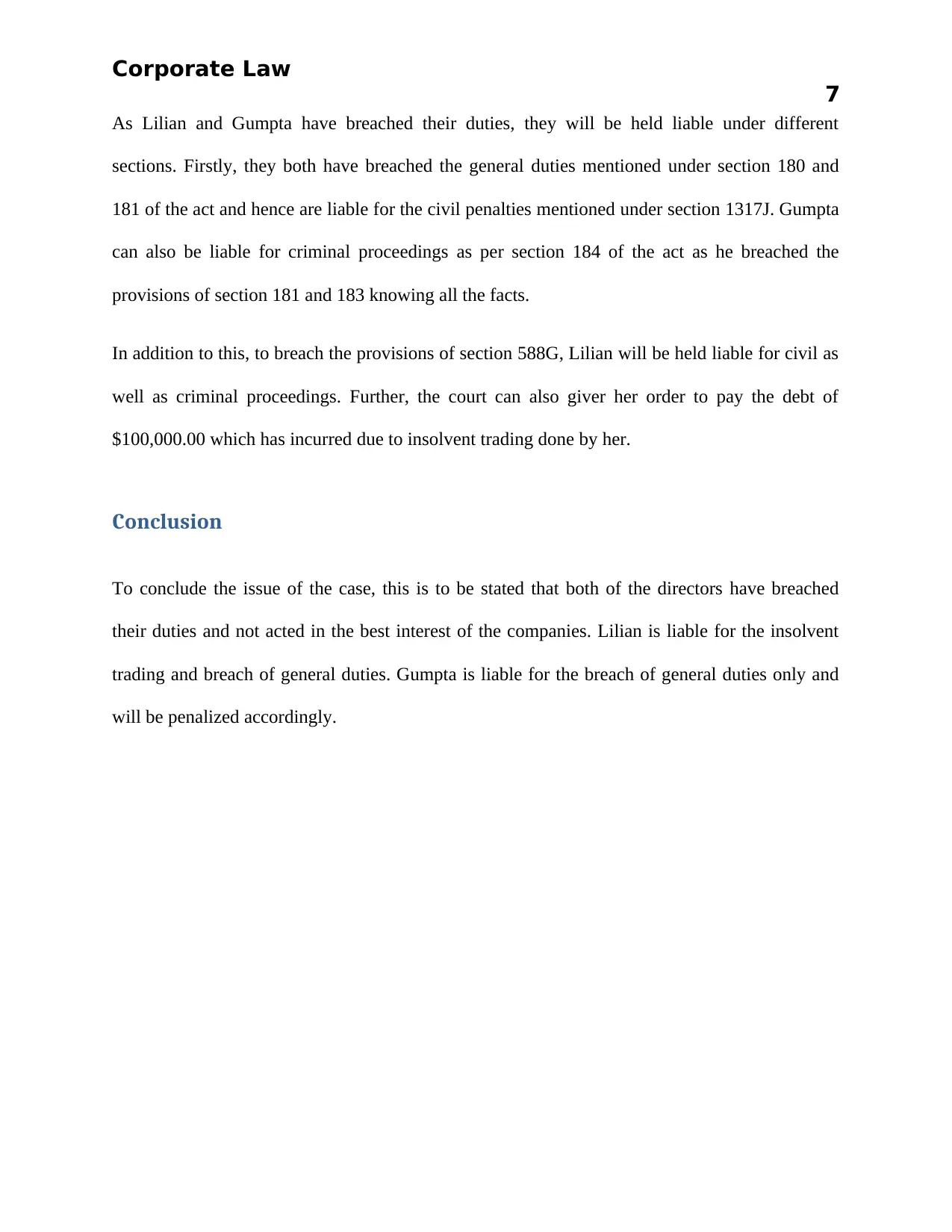
Corporate Law
7
As Lilian and Gumpta have breached their duties, they will be held liable under different
sections. Firstly, they both have breached the general duties mentioned under section 180 and
181 of the act and hence are liable for the civil penalties mentioned under section 1317J. Gumpta
can also be liable for criminal proceedings as per section 184 of the act as he breached the
provisions of section 181 and 183 knowing all the facts.
In addition to this, to breach the provisions of section 588G, Lilian will be held liable for civil as
well as criminal proceedings. Further, the court can also giver her order to pay the debt of
$100,000.00 which has incurred due to insolvent trading done by her.
Conclusion
To conclude the issue of the case, this is to be stated that both of the directors have breached
their duties and not acted in the best interest of the companies. Lilian is liable for the insolvent
trading and breach of general duties. Gumpta is liable for the breach of general duties only and
will be penalized accordingly.
7
As Lilian and Gumpta have breached their duties, they will be held liable under different
sections. Firstly, they both have breached the general duties mentioned under section 180 and
181 of the act and hence are liable for the civil penalties mentioned under section 1317J. Gumpta
can also be liable for criminal proceedings as per section 184 of the act as he breached the
provisions of section 181 and 183 knowing all the facts.
In addition to this, to breach the provisions of section 588G, Lilian will be held liable for civil as
well as criminal proceedings. Further, the court can also giver her order to pay the debt of
$100,000.00 which has incurred due to insolvent trading done by her.
Conclusion
To conclude the issue of the case, this is to be stated that both of the directors have breached
their duties and not acted in the best interest of the companies. Lilian is liable for the insolvent
trading and breach of general duties. Gumpta is liable for the breach of general duties only and
will be penalized accordingly.
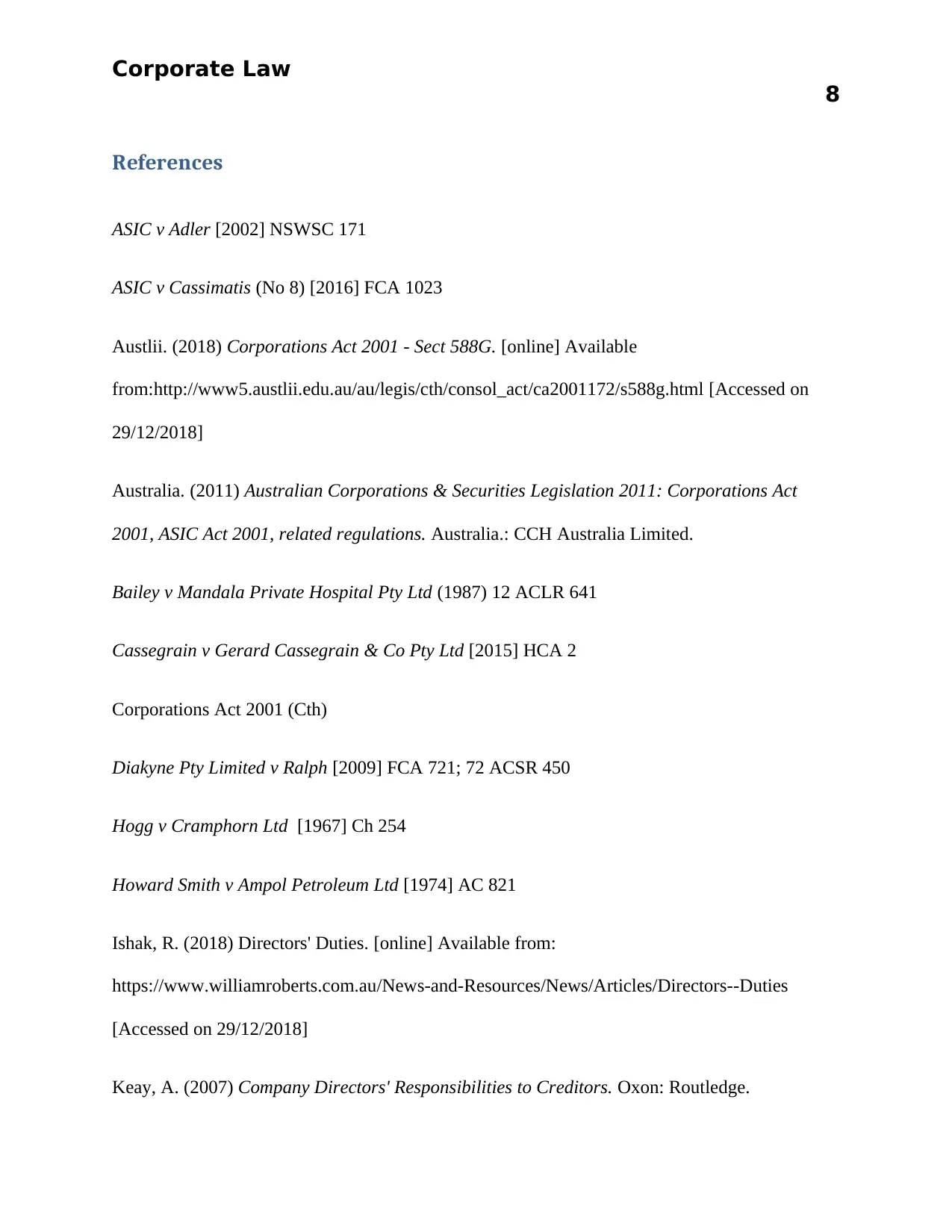
Corporate Law
8
References
ASIC v Adler [2002] NSWSC 171
ASIC v Cassimatis (No 8) [2016] FCA 1023
Austlii. (2018) Corporations Act 2001 - Sect 588G. [online] Available
from:http://www5.austlii.edu.au/au/legis/cth/consol_act/ca2001172/s588g.html [Accessed on
29/12/2018]
Australia. (2011) Australian Corporations & Securities Legislation 2011: Corporations Act
2001, ASIC Act 2001, related regulations. Australia.: CCH Australia Limited.
Bailey v Mandala Private Hospital Pty Ltd (1987) 12 ACLR 641
Cassegrain v Gerard Cassegrain & Co Pty Ltd [2015] HCA 2
Corporations Act 2001 (Cth)
Diakyne Pty Limited v Ralph [2009] FCA 721; 72 ACSR 450
Hogg v Cramphorn Ltd [1967] Ch 254
Howard Smith v Ampol Petroleum Ltd [1974] AC 821
Ishak, R. (2018) Directors' Duties. [online] Available from:
https://www.williamroberts.com.au/News-and-Resources/News/Articles/Directors--Duties
[Accessed on 29/12/2018]
Keay, A. (2007) Company Directors' Responsibilities to Creditors. Oxon: Routledge.
8
References
ASIC v Adler [2002] NSWSC 171
ASIC v Cassimatis (No 8) [2016] FCA 1023
Austlii. (2018) Corporations Act 2001 - Sect 588G. [online] Available
from:http://www5.austlii.edu.au/au/legis/cth/consol_act/ca2001172/s588g.html [Accessed on
29/12/2018]
Australia. (2011) Australian Corporations & Securities Legislation 2011: Corporations Act
2001, ASIC Act 2001, related regulations. Australia.: CCH Australia Limited.
Bailey v Mandala Private Hospital Pty Ltd (1987) 12 ACLR 641
Cassegrain v Gerard Cassegrain & Co Pty Ltd [2015] HCA 2
Corporations Act 2001 (Cth)
Diakyne Pty Limited v Ralph [2009] FCA 721; 72 ACSR 450
Hogg v Cramphorn Ltd [1967] Ch 254
Howard Smith v Ampol Petroleum Ltd [1974] AC 821
Ishak, R. (2018) Directors' Duties. [online] Available from:
https://www.williamroberts.com.au/News-and-Resources/News/Articles/Directors--Duties
[Accessed on 29/12/2018]
Keay, A. (2007) Company Directors' Responsibilities to Creditors. Oxon: Routledge.
⊘ This is a preview!⊘
Do you want full access?
Subscribe today to unlock all pages.

Trusted by 1+ million students worldwide
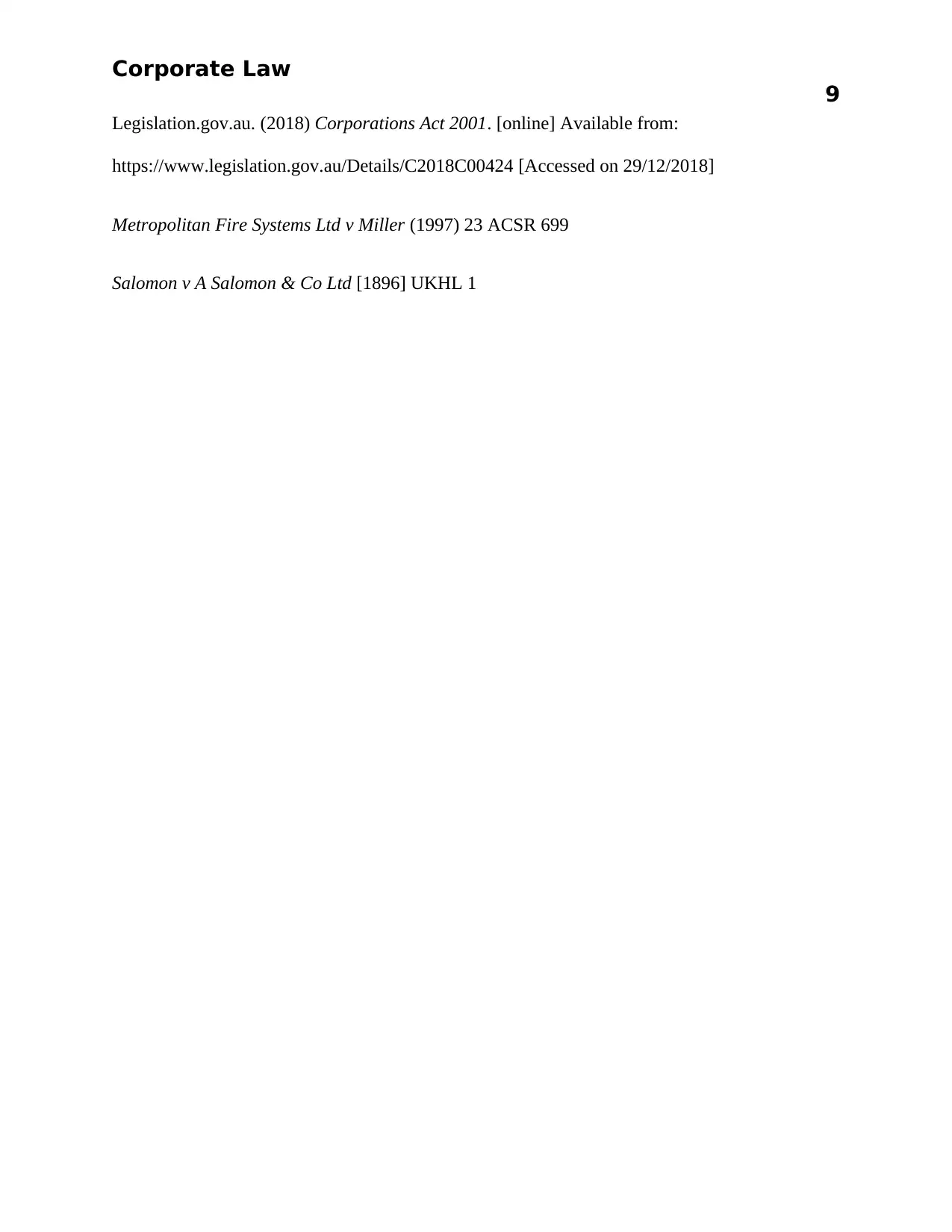
Corporate Law
9
Legislation.gov.au. (2018) Corporations Act 2001. [online] Available from:
https://www.legislation.gov.au/Details/C2018C00424 [Accessed on 29/12/2018]
Metropolitan Fire Systems Ltd v Miller (1997) 23 ACSR 699
Salomon v A Salomon & Co Ltd [1896] UKHL 1
9
Legislation.gov.au. (2018) Corporations Act 2001. [online] Available from:
https://www.legislation.gov.au/Details/C2018C00424 [Accessed on 29/12/2018]
Metropolitan Fire Systems Ltd v Miller (1997) 23 ACSR 699
Salomon v A Salomon & Co Ltd [1896] UKHL 1
1 out of 10
Related Documents
Your All-in-One AI-Powered Toolkit for Academic Success.
+13062052269
info@desklib.com
Available 24*7 on WhatsApp / Email
![[object Object]](/_next/static/media/star-bottom.7253800d.svg)
Unlock your academic potential
Copyright © 2020–2026 A2Z Services. All Rights Reserved. Developed and managed by ZUCOL.





